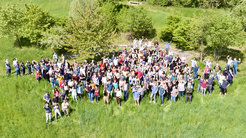25 years of Max Planck research celebrated twice
The Max Planck Institutes for Biogeochemistry and Chemical Ecology in Jena celebrate their 25th anniversary with a joint ceremony.
25 years ago, the two Max Planck Institutes for Biogeochemistry and for Chemical Ecology were founded in Jena. A few years later, they moved into their two newly constructed institute buildings on Beutenberg Campus as immediate neighbors. On June 1, 2022, they will celebrate their anniversary in a joint ceremony with renowned guests from science and politics, scientific partners, as well as former and current employees.

"It's wonderful that we can now celebrate our research with many guests after two years of the Corona pandemic," says Prof. Susan Trumbore, managing director at the MPI for Biogeochemistry. "The need to meet again and exchange ideas in person is huge."
The event will be celebrated with a promising and high-profile program. The President of the Max Planck Society, Prof. Martin Stratmann, who knows both institutes well, will give the opening address. This will be followed by greetings and congratulations from Anja Siegesmund, Thuringia's Minister for the Environment, Energy and Nature Conservation. "The two Max Planck Institutes perform research on important topics in the context of nature, environmental and climate protection. Their findings support us in politics and in decision-making. However, they also produce results that are relevant to everyday life. For example, the app "Flora Incognita," that we supported with funding, is a great tool to learn more about native plants, whether in a school class or on a hike."
The Thuringian Minister for Economy, Science and Digital Society, Wolfgang Tiefensee, the Lord Mayor of the City of Jena, Dr. Thomas Nitzsche, and the President of Friedrich Schiller University Jena, Prof. Dr. Walter Rosenthal, are also expected to address the audience.
"We are very much looking forward to the keynote lecture by Prof. Dr. Antje Boetius who heads the Alfred Wegener Institute in Bremerhaven," says Prof. Jonathan Gershenzon, managing director at the MPI for Chemical Ecology. "With her research on climate change and changes in microbial communities, she brings together significant research fields from both our institutes."
Together with the Friedrich Schiller University Jena
In many years of successful cooperation with FSU Jena, both Max Planck Institutes run graduate programs in which many German and foreign doctoral researchers have been and are being graduated. The directors and other experienced researchers are also involved in teaching at various faculties of the FSU. The Jena Experiment, which has been studying ecosystems with different biodiversity since 2002, the Collaborative Research Centres AquaDiva and ChemBioSys, the Michael Stifel Center Jena for Data-Driven and Simulation Science, and the Cluster of Excellence "Balance of the Microverse" are further examples of successful and long-term cooperation between the two MPIs and the university in Jena.
Synergisms in the immediate neighborhood
Both institutes benefit from being neighbors; the cooperation on various levels has a long tradition. From the joint library, a quick query to the respective experts next door, the joint organization of training courses and events for the public, the common use of lecture hall, seminar rooms and guest apartments, to long-term scientific projects: the partnership has evolved into an everyday routine. The anniversary event the two institutes are now celebrating together is part of this series.
Science for the eyes and ears
Prior to the actual event, ten different colorful posters with research motifs are already drawing attention to the anniversary on Jena's buses and trams. Via a QR code you can listen to the associated podcasts and get an impression of the diversity of research topics at the two institutes. Listen to our Scientists | MPI for Chemical Ecology
Profile MPI for Biogeochemistry
The Max Planck Institute for Biogeochemistry investigates the interactions between global element cycles and climate. The processes span many orders of magnitude on a spatial scale: from plant and bacterial molecules to large-scale changes in vegetation visible from space. We want to understand how living organisms - including humans - exchange important resources such as water, carbon, nitrogen and energy with their environment and how this affects global climate and ecosystems.
Max Planck Institute for Biogeochemistry | Main / HomePage
Profile MPI for Chemical Ecology
The Max Planck Institute for Chemical Ecology studies how living organisms communicate with each other via chemical signals. Since chemical communication is the oldest and most widespread language in the world of organisms, its study is of fundamental importance for understanding the interactions between plants, insects and microbes, as well as the functioning of entire ecosystems. This understanding is particularly important in an era of global environmental change, in order to predict the consequences of these changes on the distribution, abundance, and interactions of ecologically and economically important species.
Max Planck Institute for Chemical Ecology / Homepage












